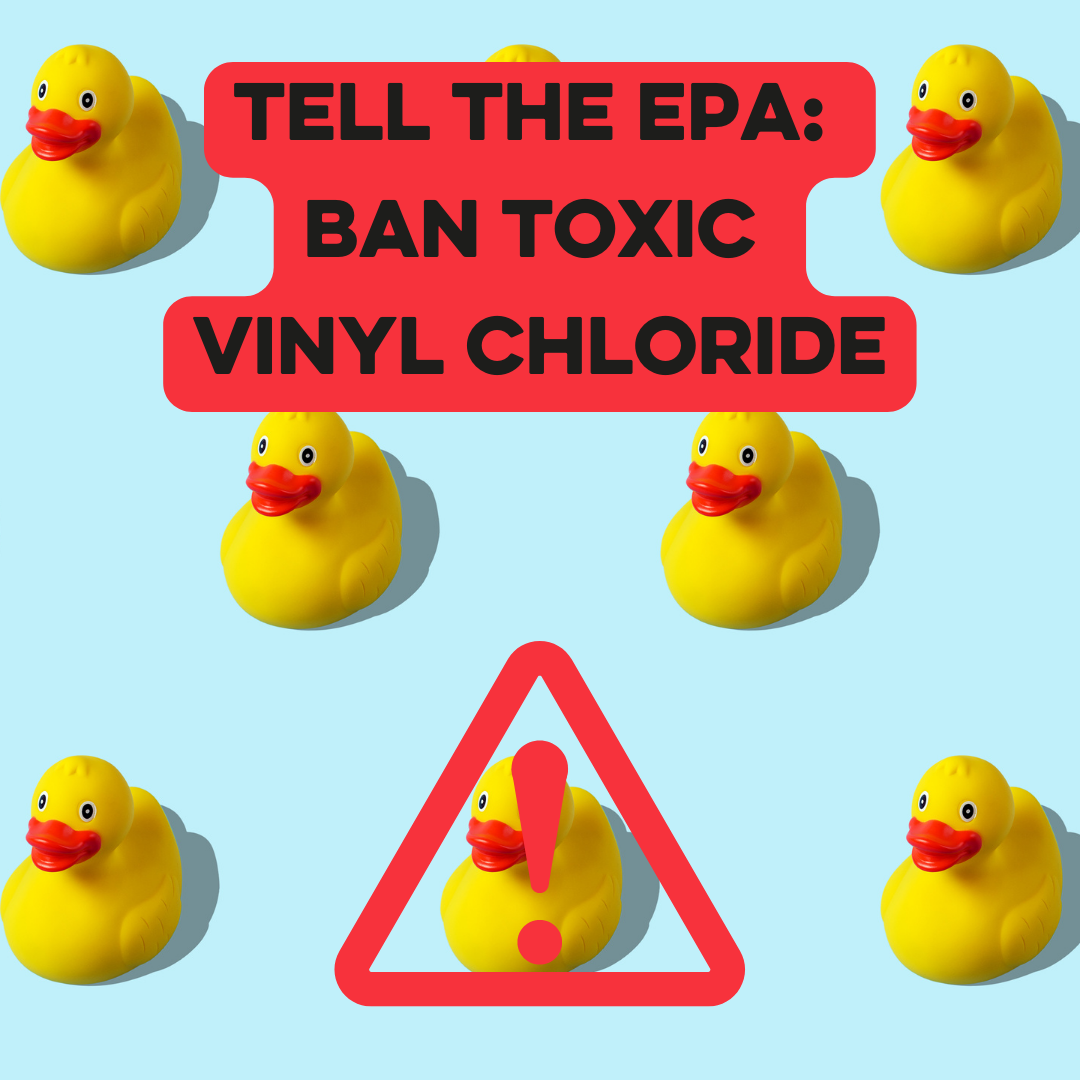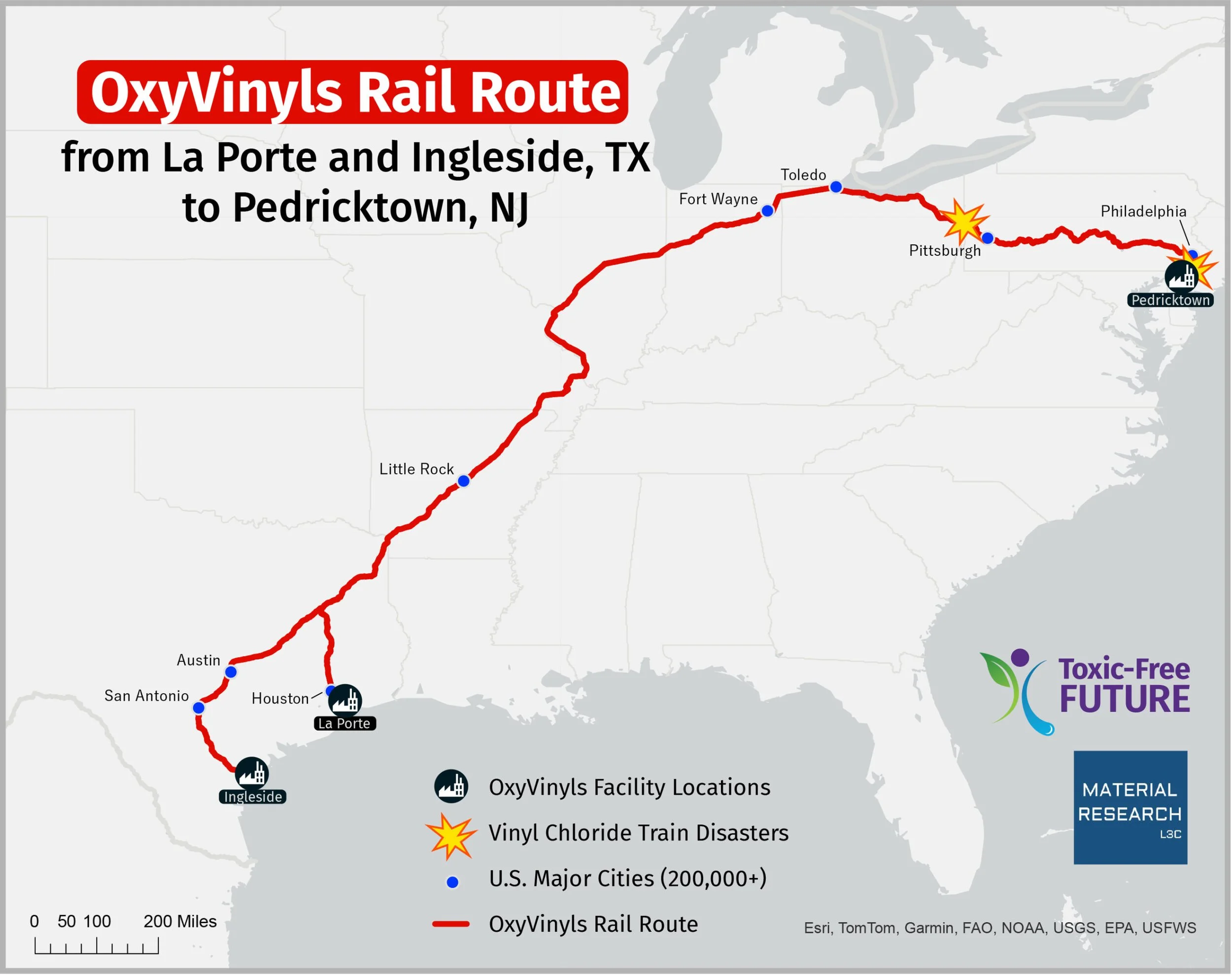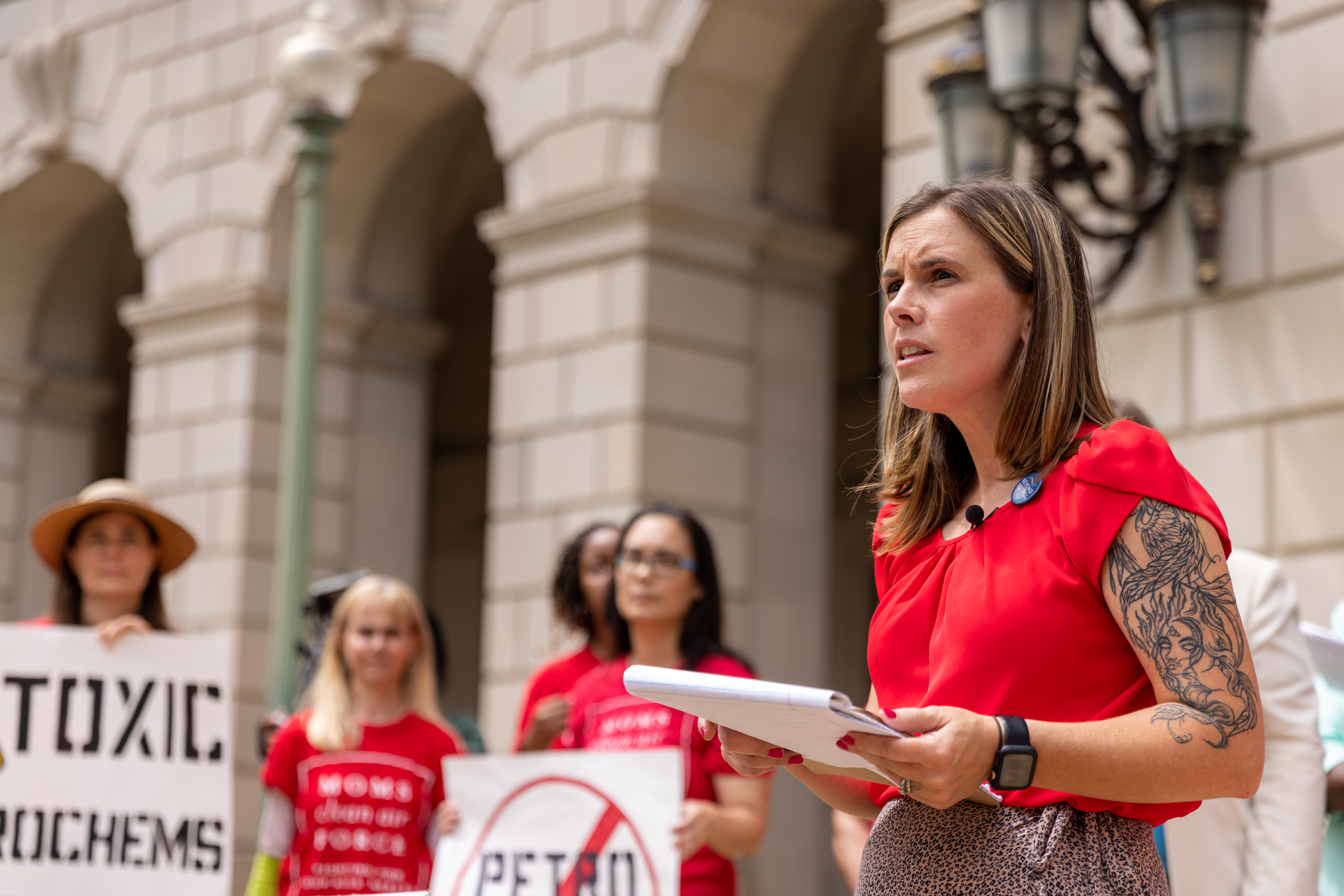TAKE ACTION | LEARN | CONTACT | RAIL ROUTE MAP | DONATE
LATEST
ABOUT VINYL CHLORIDE
Vinyl chloride is carcinogenic petrochemical that’s used almost exclusively to make polyvinyl chloride (PVC) plastic and vinyl. Vinyl chloride is known to cause cancer, reduced immune function, and neurological effects. This toxic chemical is manufactured in low-income communities and communities of color in Louisiana, Texas, and Kentucky, where it threatens the health of residents and workers.
But it’s not just vinyl chloride factory workers and residents of the communities where this chemical is manufactured who are at risk. Five of the 53 Norfolk Southern train cars that derailed in East Palestine, Ohio on February 3, 2023, were carrying vinyl chloride which was then intentionally drained and set on fire to allow freight trains to resume using the tracks. More than a year later, the residents of East Palestine and nearby communities are still grappling with an ongoing public health crisis. Unfortunately, what happened to East Palestine could happen to many other towns. A recent report found that more than three million Americans live within one mile of railroad tracks on which vinyl chloride is transported, leaving them all at risk for a similar disaster.
We’ve known that this chemical is poisonous for 50 years; the U.S. E.P.A. must take action to ban vinyl chloride! Please join us in urging the EPA to ban this toxic chemical before any more harm is done by filling out this form
-
Vinyl chloride is a synthetic, highly flammable and potentially explosive gas that is used almost exclusively to make polyvinyl chloride (PVC) plastic. It is acutely toxic and a known human carcinogen, and has harmed workers and communities for decades.
Vinyl chloride has been in the news a lot over the past year because it is the chemical that was spilled and intentionally burned in the aftermath of the February 2023 train derailment in East Palestine, Ohio. Less well known is the extent to which vinyl chloride is regularly emitted into the air and water, both during the course of normal operations at manufacturing and processing plants throughout the United States, and through unplanned air releases, leaks, and accidents – including hundreds of injuries and multiple fatalities. Vinyl chloride has contaminated air, soil, and groundwater in many communities, forcing people to either move, or suffer in place. -
In the United States, ethane gas is derived from crude oil and natural gas–much of which is hydrofracked. The ethane is then steam cracked under high temperature and pressure to produce ethylene gas, which is used in turn to make plastics and other chemicals. Ethylene and chlorine – both of which are toxic and environmentally harmful in and of themselves – are combined with a catalyst to make ethylene dichloride (EDC), another highly toxic chemical. The EDC is then cracked to produce vinyl chloride, a gas at room temperature. Click here to see a flow chart of the manufacturing process.
-
Vinyl chloride is primarily manufactured at 12 facilities owned by five companies in Texas, Louisiana, and Kentucky. It is used primarily to make PVC plastic at 14 plants in those same three states, and in Mississippi, Illinois, and New Jersey. CLICK HERE TO VIEW A MAP.
-
While some vinyl chloride is used in certain wet applications such as adhesives and coatings, the vast majority of it is polymerized (the process of combining single molecules into a larger chain-like molecule) to make polyvinyl chloride (PVC) plastic. PVC is used to make pipes for drinking water, irrigation, and sewage; building and construction products including siding, windows and flooring, electrical cable; product packaging; furniture and car parts; toys for children and pets; medical devices; clothing and footwear; and many other consumer goods.
-
Vinyl chloride can have both acute and chronic effects on the human body, depending on the type and level of exposure. Plant workers breathing in high levels of vinyl chloride may experience dizziness, headaches, and other effects on the central nervous system. The chemical can also irritate the eyes and respiratory tract, and can inhibit blood clotting. There is broad scientific consensus that chronic exposure to vinyl chloride results in liver damage and an increased risk of angiosarcoma and other liver cancers. Studies suggest that chronic exposures can damage the kidneys, central and peripheral nervous systems, joints, and skin; can increase the risk of cancers of the breast, brain, and lung, as well as lymphoma and leukemia. There is no level of exposure to vinyl chloride that is considered completely safe.
Health impacts are not limited to those who work at manufacturing sites. Air and water contaminated with vinyl chloride also impacts fenceline communities – those who live near vinyl chloride or PVC plants – as well as those who live along transportation routes.
Finally, the general population can be exposed to residual (unpolymerized) vinyl chloride present in PVC pipes that deliver drinking water, and in consumer products including toys and clothing. More study is needed by EPA to thoroughly evaluate these potential exposure pathways. -
When vinyl chloride burns, for example in planned waste incineration, combustion byproducts are produced. The most toxic of these include phosgene, hydrogen chloride, and uncombusted vinyl chloride monomer. Dioxins are also created and released when vinyl chloride burns in an uncontrolled setting, such as in East Palestine, Ohio; Paulsboro, New Jersey; and Illiopolis, Illinois.
-
The U.S. Environmental Protection Agency (EPA) has the authority to ban vinyl chloride under the Toxic Substance Control Act (TSCA). In December 2023, the U.S. EPA named vinyl chloride as one of the five chemicals that is a candidate for high-priority designation. There are two 90-day comment periods during this “prioritization” process. Once EPA formally designates vinyl chloride as high priority – which will likely happen by December 23, 2024 – it will begin to conduct a multi-year, cradle-to-grave risk evaluation process, which will include at least one comment period. If EPA finds that vinyl chloride presents “unreasonable risk,” it will start a multi-year “risk management” process, which will also include at least one comment period. During the risk management process, EPA can decide to ban vinyl chloride. During any of the upcoming comment periods, you can submit a comment and tell the U.S. EPA why they should ban vinyl chloride.
-
The Toxic Substance Control Act (TSCA) is a federal law that provides EPA with broad authority to regulate chemicals across their lifecycle, from manufacturing through disposal. The law requires EPA to ensure that any chemical in commerce does not present “unreasonable risk” in connection with the circumstances under which that chemical substance is intended, known, or reasonably foreseen to be manufactured, processed, distributed in commerce, used, or disposed of including foreseeable but unplanned events like the weekly releases of vinyl chloride from accidents, leaks and spills. EPA must also determine whether the chemical presents unreasonable risk to any “potentially exposed or susceptible subpopulation,” such as infants, children, pregnant women, workers, or the elderly. EPA’s risk evaluation must take into account aggregate and cumulative risks from all pathways of exposure, using all reasonably available information (which includes information that EPA can reasonably gather and generate).
-
Item description
-
The TSCA process takes place over a period of roughly six years. It begins with a 12-month prioritization period to determine if vinyl chloride will receive a “high priority” designation. Once a high-priority designation is determined, a comprehensive two-three-year risk evaluation will be conducted followed by a two-three-year risk management rule-making process.
-
Fenceline communities have both greater exposure and greater susceptibility to harm from vinyl chloride than the general population, as do children and people living along transportation routes and near waste disposal sites.
Almost two thirds of the people living within a three-mile radius of vinyl chloride and PVC plants are people of color, compared to 41% nationwide. Residents of these areas earn an average of $23,747 per capita: 37% below the national average of $37,638. Twenty-seven percent are children, compared to the national average of 22%.
Drinking water contamination and toxic air pollution have forced a large proportion of the residents of at least four Louisiana fenceline communities to relocate; other EJ communities remain at serious risk.
Sources: https://toxicfreefuture.org/research/pvc-poison-plastic/pvc-plastic-and-environmental-justice/
-
This is the easy part! Your help is imperative to get a ban on toxic vinyl chloride. Here are some options for you.
Urge US EPA Administrator Michael Regan to ban vinyl chloride as quickly as possible under TSCA. Click here to email him now.
Ask your members of Congress to support the banning of vinyl chloride. Click here to email your U.S. Senators and Representative now.
Educate yourself and spread the word. Check out our vinyl chloride fact sheet and share it with your closest friends or consider tabling at an event at your local library, school, or community center.
Raise awareness in your community by hosting a free screening of the award-winning documentary film, Blue Vinyl. Learn how to host a screening.
Submit a public comment to the US EPA explaining why they should ban vinyl chloride. The EPA’s first comment period ended on March 18, 2024 but another comment period will be announced later in 2024.
Although East Palestine is the most recent vinyl chloride disaster, it is far from the first time this toxic chemical has caused major damage
For example, in 2012, train cars carrying vinyl chloride derailed in Paulsboro, New Jersey, releasing a toxic plume of the chemical into the community. Unfortunately, what happened to the people of East Palestine, Ohio and surrounding areas in February 2023 could happen to many other communities. A recent report by Toxic-Free Future found that more than 3 million Americans live within a mile of railroad tracks on which vinyl chloride is transported, putting them at risk for a similar public health and environmental disaster. Until the EPA bans vinyl chloride, the question of another vinyl chloride accident is not if but when it will occur.
Many common household and consumer goods as well as building materials and automotive parts are made of PVC or vinyl. Click here to download a fact sheet about vinyl chloride.
REPORTS, STUDIES, SCHOLARLY ARTICLES & FACT SHEETS
REPORT: Toxic Cargo: How rail transport of vinyl chloride puts millions at risk, an analysis one year after the Ohio train derailment | Toxic-Free Future | January 2024
STUDY: Vinyl Chloride Toxicity | StatPearls | June 2023
REPORT: The Perils of PVC Plastic Pipes | Beyond Plastics | April 2023
REPORT: PVC Poison Plastic: An investigation following the Ohio train derailment of widespread vinyl chloride pollution caused by PVC production | Toxic-Free Future | April 2023
FACT SHEET: Vinyl Chloride - A Toxic Chemical That Threatens Human Health | Beyond Plastics | April 2023
FACT SHEET: Vinyl Chloride | National Institutes of Health
FACT SHEET: Vinyl Chloride & Health | California Air Resources Board
IARC MONOGRAPH: Vinyl Chloride | NIH National Library of Medicine
ARTICLE: Dioxins and polyvinylchloride in combustion and fires | ISWA | July 2015
ARTICLE: Pro/Con Vinyl Is Lethal | Green Building Advisor | January 2009
STUDY: Polyvinyl chloride toxicity in fires. Hydrogen chloride toxicity in fire fighters | JAMA | 1976
ARTICLE: Vinyl Chloride: A Case Study of Data Suppression and Misrepresentation | EHP | 2005
EPA to formally review vinyl chloride risks, may evaluate styrene | Packaging Dive | 12/19/24
A 'pressure event' occurred at a Geismar facility Wednesday morning. Here's what we know. | The Advocate | 12/18/24
East Palestine: demoralized by the justice system | Morning Journal | 10/2/24
Environmentalists Urge Strict Review Of Vinyl Chloride To Set Up TSCA Ban | Inside EPA | 7/25/24
The E.P.A. Moves Toward Regulating a Widely Used, Dangerous Chemical | The New York Times | 7/24/24
EPA takes next step toward banning chemical spilled in East Palestine crash | The Hill | 7/24/24
Beyond Plastics News Release: EPA Proposes Designating Vinyl Chloride as a High-Priority Chemical 40 Years After It Was Declared Cancerous | 7/24/24
Researchers Discuss Data from Testing in East Palestine | Business Journal |4/15/24
Chemical spilled in East Palestine involved in 966 accidents since 2010: Report | The Hill | 3/26/24
Toxic vinyl chloride accidents happen once every five days, report finds | The New Lede | 3/26/24
Accidents Involving Toxic Vinyl Chloride Are Commonplace, a New Report Finds | Inside Climate News | 3/26/24
Beyond Plastics News Release | New Report: Vinyl Chloride Accidents Have Happened Once Every Five Days Since 2010 | 3/26/24
Jess Conard, Beyond Plastics, discusses the anniversary of the toxic Norfolk Southern train derailment in East Palestine, OH | Food Sleuth Radio | 2/6/24
A plastic chemical caused a toxic mess in Ohio last year. Now, the EPA is eyeing regulation | Grist | 1/9/24
Beyond Plastics News Release: U.S. EPA Takes First Step in Potentially Banning Vinyl Chloride | 12/24/23
EPA begins formal review of vinyl chloride, toxic chemical that burned in Ohio train derailment | AP | 12/14/23
EPA begins formal review of 5 toxic chemicals, including one in Ohio train derailment | USA Today | 12/14/23
Beyond Plastics News Release: Environmental Leaders Deliver 5,869 Petition Signatures to EPA Calling for Vinyl Chloride Ban | 12/6/23
Beyond Plastics News Release: EPA Must Go One Step Further in Replacing Lead Service Lines & Advise Against Using PVC Plastic Pipes | 12/1/23
Beyond Plastics News Release: New Documentary Recounts Devastating Impacts of Vinyl Chloride in East Palestine, Ohio | 10/13/23
Ohio residents rally in DC for Vinyl Chloride ban, Emergency Aid | News Nation Now | 7/28/23
The Allegheny Front: Ohio Activists Join National Groups to Deliver Petition to EPA to Ban Vinyl Chloride | 7/28/23
Beyond Plastics News Release: Environmental Leaders Deliver 27,570 Petition Signatures to EPA Calling for Ban on Vinyl Chloride | 7/27/23
President Biden, Come to East Palestine and Bring FEMA With You | Newsweek Opinion | 7/21/23
How to ‘Make Some Good’ Out of East Palestine, Ohio, Rail Disaster? Ban Vinyl Chloride, Former EPA Official Says | Inside Climate News | 3/17/23
Beyond Plastics News Release: The True Cost of Plastics: New Video Documents East Palestine Residents’ Experiences After Toxic Train Derailment | 3/16/23
East Palestine Toxic Train Crash Shows Plastics Industry Toll on Planet. Will U.S. Ban Vinyl Chloride? | Democracy Now | 3/13/23
Beyond Plastics News Release: Beyond Plastics and Hip Hop Caucus Call on EPA to Ban Vinyl Chloride | 3/9/23
Why Is the E.P.A. So Timid in the East Palestine Train Disaster? | New York Times | 3/8/23
The East Palestine Disaster Was a Direct Result of the Country’s Reliance on Fossil Fuels and Plastic | The Boston Globe | 2/24/23
This Deadly Chemical Should Be Banned | 2/19/23 | New York Times
The Myth of Safe Plastics Persists, Despite Risk of Disasters Like East Palestine | The Intercept | 2/18/23
The Ohio Derailment Lays Bare the Hellish Plastic Crisis | Wired | 2/18/23
What the Ohio Train Derailment Says About the Dark Side of Plastics | Bloomberg | 2/15/23
Ohio Train Derailment Vinyl Chloride Disaster Is Another Painful Reminder of PVC Plastic’s Toxic Lifecycle | Toxic-Free Future | 2/17/23
Beyond Plastics News Release: HOLIDAY ALERT: Polyvinyl Chloride (PVC) Plastic Gift Cards Are On The Naughty List | 11/25/22
TOXIC TILES: How Vinyl Flooring Made With Uyghur Forced Labor Ends Up at Big Box Stores |The Intercept | 6/14/2022
Please consider making a secure, tax-deductible online gift to support the campaign to ban vinyl chloride and advance Beyond Plastics’ work to end plastic pollution everywhere.
Your gift will help us amplify the voices of front line communities, engage more grassroots advocates in this campaign, educate more decision-makers and elected officials, and more.










